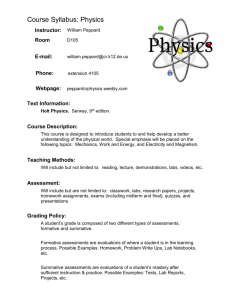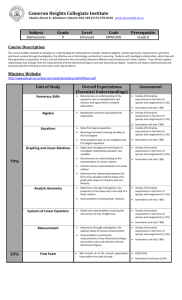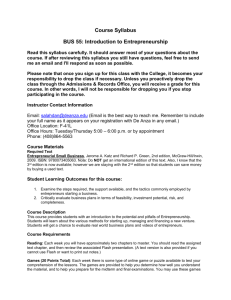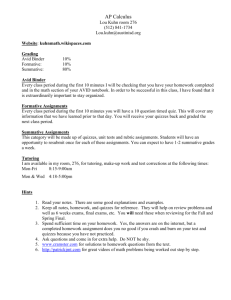Click here for the Global Civics Course Guide
advertisement
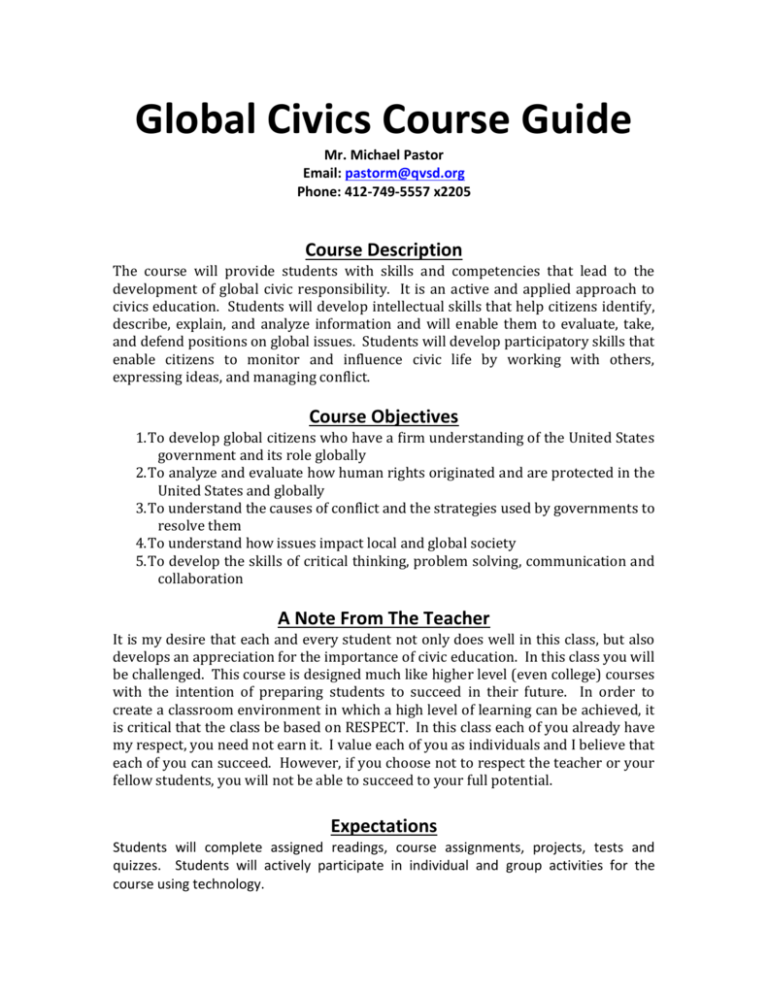
Global Civics Course Guide Mr. Michael Pastor Email: pastorm@qvsd.org Phone: 412-749-5557 x2205 Course Description The course will provide students with skills and competencies that lead to the development of global civic responsibility. It is an active and applied approach to civics education. Students will develop intellectual skills that help citizens identify, describe, explain, and analyze information and will enable them to evaluate, take, and defend positions on global issues. Students will develop participatory skills that enable citizens to monitor and influence civic life by working with others, expressing ideas, and managing conflict. Course Objectives 1. To develop global citizens who have a firm understanding of the United States government and its role globally 2. To analyze and evaluate how human rights originated and are protected in the United States and globally 3. To understand the causes of conflict and the strategies used by governments to resolve them 4. To understand how issues impact local and global society 5. To develop the skills of critical thinking, problem solving, communication and collaboration A Note From The Teacher It is my desire that each and every student not only does well in this class, but also develops an appreciation for the importance of civic education. In this class you will be challenged. This course is designed much like higher level (even college) courses with the intention of preparing students to succeed in their future. In order to create a classroom environment in which a high level of learning can be achieved, it is critical that the class be based on RESPECT. In this class each of you already have my respect, you need not earn it. I value each of you as individuals and I believe that each of you can succeed. However, if you choose not to respect the teacher or your fellow students, you will not be able to succeed to your full potential. Expectations Students will complete assigned readings, course assignments, projects, tests and quizzes. Students will actively participate in individual and group activities for the course using technology. The Nature of a Shared Experience In this course, students will have the opportunity to create the content with their daily class engagement. As the instructor, I believe firmly that all students have something to give as well as something to gain from this course. While I may have some level of expertise regarding the content, I believe that students and the teacher share responsibility in examining the content in a meaningful way. As a discourse community, we will move through the content in an organic way that relies on constant student input. To put it simply, students will gain the most from the course if they are constantly participating in the daily discussion. No individual is the sole source of information on any topic, with that said, students in this course will create a unique educational experience that allows for relevance and critical thinking to drive all that we do. Course Grading Grades in this course are determined in accordance with the Quaker Valley High School grading policy. In this course, 80% of a student’s grade will be determined by Assessments OF Learning, meaning those assessments that are summative and reflect a student’s ability to show their application of knowledge. 20% of a student’s grade will be determined by Assessments FOR Learning, meaning those assessments that are formative in nature and reflect ongoing learning that informs the teaching and learning process. While there is not a predetermined amount of points possible for each grading period, assignments will follow this general trend. Assessment Type Summative - Exams, Quizzes, Projects, Papers Formative – Homework, DBQ, Current Events Percentage of Grade 80% 20% Exams – points will vary (Assessment Type - Summative) Exams are summative assessments of student understanding of a unit of course content. These exams will be multi-format and utilize multiple choice, fill in the blank, matching, true/false, short answer, and essay questions. Papers, Projects, Essays – points will vary (Assessment Type - Summative) These assignments will focus student learning on a specific piece of course content. Student writing will be a focal point of this course and assignments requiring student writing will be frequent. Document Based Questions (DBQs) will be a staple for the writing in this course. Typed assignments are required. Quizzes – 15-20 points (Assessment Type – Summative) Quizzes will be assessments that gauge student learning of preceding course content. The quizzes will be short answer/essay format. Discussion Board – 10 points (Assessment Type – Formative) The intent of this assignment is to engage the class in a discussion of world events that impact each of us. Students will be asked to participate in the online discussion board. Homework Engagements – 20 points (Assessment Type - Formative) For any homework assignment, you will have three choices of homework engagements to choose from; practical, analytical, and creative. At the conclusion of the year, you must have four engagements from each of the three categories, with the remaining engagements being your choice. Your task is to write a reflective engagement that reflects a deep understanding of the knowledge. Students are expected to refer to course content and texts where appropriate. The following is a further description of the three types of engagements. Practical In a practical engagement, your task is to present a practical solution to some issue that arises in the course content. For example, your may suggest a way to get more young people between ages 18-24 to vote in the upcoming Presidential election. The goal here is to take the relevant course content and provide a practical solution to an issue. Analytical This is the style of writing with which you are probably most familiar. You may analyze a document, policy, law, social movement, or any other piece of course content. You may write this engagement in several ways including but certainly not limited to compare/contrast, descriptive analysis, and predictive. Creative A creative engagement is one that allows you great freedom in your response type. Put simply, creative engagements can be anything that shows your understanding of the content in a creative way. Some examples include but are not limited to perspective journal writing, musical composition, artistic expression, creative writing, or anything else that you see as relevant. Homework is to be completed for the required due date. Homework is to serve as an extension of the course to deepen your knowledge and understanding of the content. You will notice that the course homework will follow the same progression as lectures, quizzes, and exams. Midterm and Final Exams Midterm Exam The midterm exam will be a comprehensive examination of student learning of the course content for all of Unit 1. The exam will include both essay questions and a DBQ. Final Exam The final exam will be a comprehensive examination of student learning of the course. The exam will include both essay questions and a DBQ. *The Midterm Exam and Final Exam will combine for a total of roughly 20% of your final grade. These scores are not factored into any Term grade, they are added on to your final grade as 20% of the Year (Y1) Grade. Attendance and Behavior Students are expected to be in class all of the time. If you are not in class, you cannot learn the course material or take part in course activities. If an absence occurs, the student is expected to take the necessary actions to ensure that they do not fall behind with the coursework. If an extenuating circumstance exists (i.e. prolonged illness, family emergency, ect.) special arrangements will be made. If you are aware of an upcoming absence, please inform the teacher as early as possible. The expectation is that you will behave like an adult. I challenge each of you to take ownership of your education; this requires you to behave in a manner that allows you to succeed. Students are expected to comply with Quaker Valley’s code of conduct. Course Outline Essential Question for the Course: What does it mean to be a global citizen? Unit 1 – Human Rights (12 weeks) o Essential Questions o What are basic human rights? o Who is responsible for guaranteeing human rights? **Midterm Exam** Unit 2 – Global Governance (6 weeks) o Essential Questions o What gives government legitimacy? o How can political systems be set up to solve conflict and adopt decisions? Unit 3 – Local Issues Span Globally (6 weeks) o Essential Questions o What are rights, duties, and responsibilities of citizenship? o How do local issues have a global impact? **Final Exam** Please note, for AB and BC courses, the Final Exam will be cumulative and will represent all content from the course. For split AC courses, the Final Exam will only cover content from the second half of the course (Units 2 & 3).

